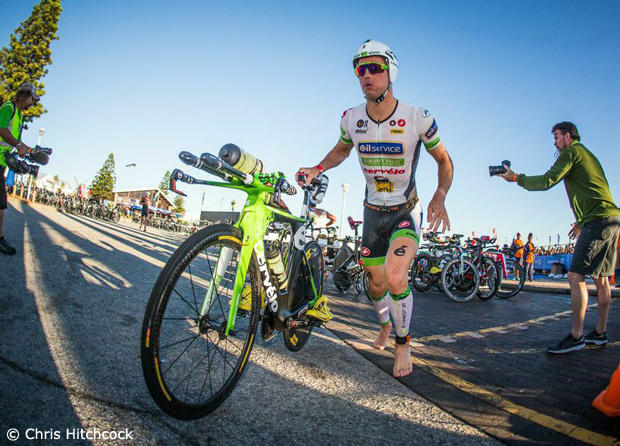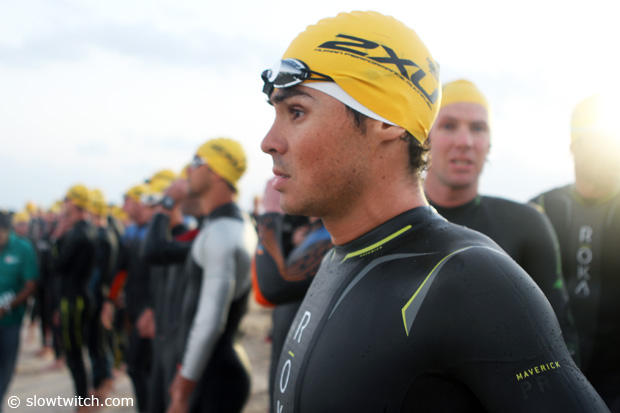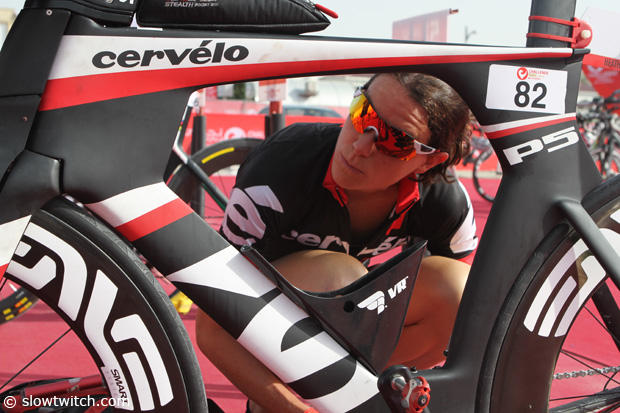David McNamee on the long road
David McNamee has been competing in ITU events until last year and had initially had his mind set on the Olympic Games in Rio but this year he stepped up to go long at Challenge Dubai and even longer at Ironman South Africa. He talked to slowtwitch about the change and his experience so far.
Slowtwitch: It is good to chat with you David.
David McNamee: Thanks it is always good to sit down and talk triathlon. Especially since Ironman South Africa I have been doing very little apart from lying in bed.
ST: How is your body feeling?
David: In a world of hurt and I have one speed right now – a shuffle. Even at that speed my quads sometimes decide to seize up and force me to grab onto something before I fall. Walking with coffee is a haphazard activity right now. I hope the saying that `The first time is the hardest` is correct.
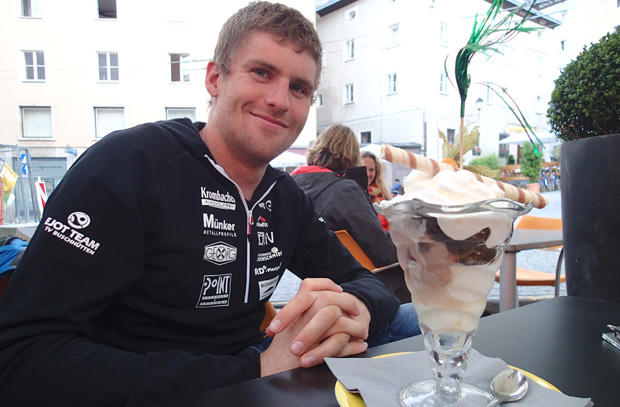
ST: It was your first full distance outing I believe. Talk about it.
David: I was pretty blown away by the atmosphere in South Africa especially on the marathon. It certainly was a massive help to get me through the race. Coming straight from short course racing I found the pace on the swim comfortable but as soon as we hit dry land I was very quickly on the back foot.
I rode with the main group for 110 km, but then as we hit the bottom of the climbs on the 2nd lap the fireworks started. The pace shot up, my quads shut down and I was dropped with a couple of others. However I managed to keep focused and limit my losses as much as possible and enter T2 with a top10 still being possible.
Then there was the marathon. Ouch. My ITU instinct kicked in and I went of far too fast and flew past several guys. They must have chuckled to themselves knowing I could never keep it up. At 10km I began to pay for the effort and spent the rest of the day trying to hold onto my position.
ST: Compare the atmosphere to some of the big ITU events.
David: Compared to the big ITU events there is more of a relaxed atmosphere around race day. I think having pros and age group athletes racing together really helps create this. And when there is much less importance on the fight to the first swim buoy it helps me chill out.
The atmosphere from the crowds on the run course is also different. In ITU there is a wall of noise, great encouragement but you struggle to appreciate it you are so focused on hanging on to the guy in front. You can handle that intensity for 30 minutes.
On the marathon at the weekend it was different, it felt more individual. Also with crowds being out there all day they start coming up with some inventive words of encouragement. On my 2nd lap, as I was going through one of my low points I heard someone scream at me “You are hairy and scary and hunting them down.” My spirits were lifted, I had a good chuckle to myself and the next couple of kilometers seemed to pass much easier.

ST: And 7th place in that field is certainly not shabby.
David: Yeah for sure, I think except from racing in Kona I don't think I could have picked a harder field to go up against. However I like that, in my mind its good to put a marker in the sand, see how you stand up against some of the best guys in the World and see exactly what you need to improve.
ST: How did you choose that event, versus any other?
David: I knew being a Championship race it would draw a great field. Its also easy travel from the UK and being one of the first Ironman events on the calendar it allowed me to see straight away how I would cope.
ST: Interestingly enough this past weekend, Tom Bishop who finished a spot behind you [McNamee – Silver, Bishop – Bronze] at the 2011 ITU Worlds in Beijing, raced the WTS event in Auckland in support of Jonathan Brownlee, and you raced in support of yourself in South Africa.
David: To be honest I haven`t seen Auckland so can’t really comment on that race. However based on the Olympic policy I can fully appreciate why people are `auditioning` for the role. In a race I very much focus on how I can best optimize my chance of success. It is what inspires me.
ST: Last year you still raced ITU events and competed in the Commonwealth Games in July. When did you first have the thought of going long and what caused it?
David: In late December I saw our Olympic policy and exchanged some emails with our performance director. Based on these I then sat down with my coach and had a realistic discussion, the outcome being that it was extremely unlikely that I would be heading to Rio. I then quickly realized that I had lost my passion for ITU, it had been dwindling since the Commonwealth Games and I think Rio was the one thing keeping me going.
Then in January I took myself of the BTF Performance Programme and started riding a time trial bike.
ST: Was there anxiety or nervous thoughts in that process?
David: No strangely there were not and that confirmed to me that I was making the right decision. For me to get the best out myself I need something to aim for that inspires me and in long course racing I have found it again. That is what is fundamentally important to me, then it is about getting good enough to afford to chase it.
ST: Was Challenge Dubai your first proper longer non-drafting event?
David: I raced a local half ironman in 2013 but yes I would call Dubai my first proper event.
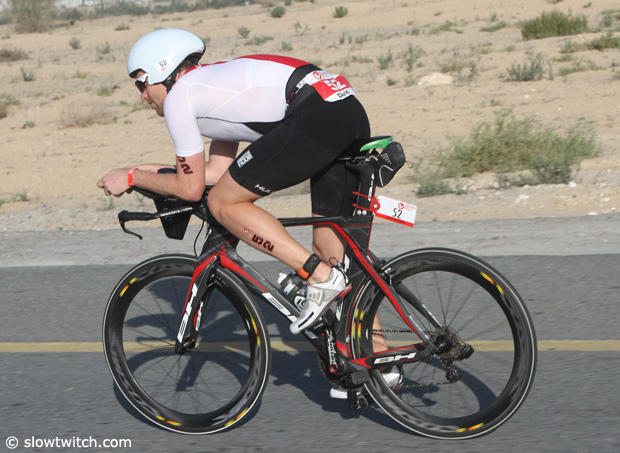
ST: How did that race find you?
David: Tough. Again the swim went smoothly but by half way on the bike I was cooked. Having spent my life on a road bike it is going to take some time before I get use to the art of time trialing.
ST: Was there a point during the Dubai race when you thought “if this was an ITU event I would be already showered and sipping a coffee.”
David: Not a coffee but possibly a beer. Or even several beers [as] I was in such a hole.
ST: You ended up 21st. Was that to some degree discouraging?
David: I wouldn't say discouraging but more disappointing. I knew going into the race I would struggle on the late stages of the bike and I did. However I wasn't even able to live with the pace at the start and that was worrying for me. However despite my ass kicking I never doubted that I should go race in South Africa.
ST: Fraser Cartmell is your mentor. How did you two connect?
David: I would describe Fraser as the guy I go to with all my silly newbie questions especially around events. Like asking what the heck is this special needs thing they keep going on about and do they really take your bike from you as you enter T2? It's a lot less stressful being at these races with someone who has been through it all before. I have known Fraser for years having both been based at the Scottish High Performance Centre in Stirling.
ST: What was the best advice you have been given, or maybe just the most amusing one?
David: Imodium to help limit or even prevent the portaloo stops.
ST: But are you coached by Joel Filiol?
David: Yes that is correct. Joel mainly coaches ITU athletes but as you are aware he has a few notable exceptions. Moving forward I intend to continue working with him and joining the group training camps whenever possible. I feel at this early stage its crucial to have as much contact time as I can with Joel and its always a pleasure and extremely productive to meet up with the team. I even try and hang on in some track sessions still.
ST: Earlier in 2014 you broke your wrist. Did that all heal properly?
David: It healed as well as it could have. Unfortunately I was left with some permanent damage both in terms of range of motion and minor nerve problems. I feel lucky though as the recovery has been better than the surgeon predicted.
ST: Has it impacted your swimming?
David: Yes the right catch is no longer as good as it was. I have tried to compensate by shifting my overall swim fitness up by knocking out more swim lengths, the one area that I still struggle with is the top end efforts.

ST: So what is next?
David: Well first I need my legs to allow me to move in a somewhat athletic manner. Then I will start preparing for Mallorca 70.3. Our squad was based on the island at the start of the year so I know the course well. Then I will focus on another Ironman in the summer-probably either Frankfurt or UK.
ST: Are you pushing for Kona?
David: Yes very much so. The long term aim is to reach the Kona podium. In order to get there I need to see what it will take. Having never even flown to watch Kona I have a lot to learn about racing there to best prepare myself for an attack on the podium places.
ST: Talk about your sponsors and how different it is dealing with that compared to ITU stuff.
David: Unfortunately when you decide half way through winters training that all of a sudden you are stopping racing the stuff you do well and get sponsored for it is met with hesitation. I can fully understand this and hope to build new relationships in the near future.
However thankfully I still receive product support from Sketchers and HUUB who have provided me with anything I need. Also a very good friend has let me borrow his TT bike until I can sort something out.
Sponsorship now is slightly different to being in the ITU, the main change being I now have full ownership over what can be displayed on my race day kit. It is also more important to build good relationship that benefits both parties. In Britain we are very lucky that if you are on the BTF Olympic Performance Programme you get a regular monthly payment into your bank. This provides you with some level of security but may leave you not as motivated to seek out potential companies to partner with.
ST: Anything else we should know?
David: If you are ever bored and have 5 minutes then I can strongly recommend davidmcnamee.co.uk where I post sporadic musings on training, racing and life.


